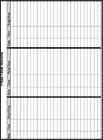
Peak Flow Meter
What is a peak flow meter?
A peak flow meter is a small hand-held device that measures the fastest speed air can be blown out of the lungs. Peak flow readings tell you if your child's asthma is in good control, if your child needs to take medicine, or if you need to get help right away.
Measuring the peak flow regularly can help detect a coming asthma attack. Also, using the colored zone system (green, yellow, red) on the peak flow meter will help you know how to help your child and better manage your child's asthma.
The peak flow meter has a sliding marker that moves as air is quickly blown into the device. The marker stops at a place on a numbered scale that measures the fastest speed air was breathed out. The numbered scale usually ranges from 0 to 750. There are meters for smaller children that range from 0 to 350. There are several different types of peak flow meters. For accurate readings, it is very important to follow the instructions carefully.
When should my child use a peak flow meter?
The first thing you will need to do is to figure out your child's "personal best" peak flow reading. This is done by taking peak flow measurements twice a day for a couple of weeks. The personal best reading will help you and your health care provider have a measure to judge all future readings by. You should update your child's personal best reading every 6 months or when he gets a new meter.
Your health care provider may recommend that your child keep a daily record of the peak flow readings or suggest that your child take readings 2 or 3 times a week. Use a chart to record your child's peak flow readings along with the date and time of day the readings are taken.
- Daily use: If your child needs to record his peak flow every day, the first reading should be a morning reading (before taking any medicine). If the reading is less than 80% of the personal best, have your child take his quick-relief medicine, then wait 10 minutes and test again. Take a peak flow reading in the early afternoon if your child's morning peak flow reading is less than 80% of his personal best. Your provider may recommend taking another measurement before taking medicines in the evening is often recommended.
- Weekly use: If your child only needs to take readings a few times a week, take a reading in the morning and again in the evening each day that you take a measurement. Measure the peak flow before taking inhaled medicine. If a quick relief (bronchodilator) medicine is used, repeat the peak flow after 15 minutes and record any change. If there is more than a 20% variation between the morning and afternoon readings, talk to your health care provider about how to manage the asthma better.
You should also measure your child's peak flow reading when an asthma attack occurs and both before and after using the quick relief medicine to check how well the medicine is working.
What do the peak flow numbers mean?
Because everyone has a different lung capacity, everyone has a different "personal best" peak flow reading. Your health care provider will give you guidelines to follow based on your child's personal best reading. In general, if your child has a peak flow that is 80% (or better) of his personal best, it means that the asthma is under control. A number between 50% and 80% of the personal best means that your child needs to take a quick-relief medicine. Lower than 50% means that your child is having serious asthma symptoms and needs immediate help.
How is the peak flow meter used?
Each brand of peak flow meter works a little differently. Carefully read and follow the instructions included with your meter. Make sure your child tries to do the test correctly. You will not get an accurate reading if your child does not give his best effort.
General instructions are:
- Place the mouthpiece on the peak flow meter. (Some meters have different sizes of mouthpieces for younger and older children and some do not have mouthpieces at all.)
- Place the marker at the bottom of the numbered scale (zero or the lowest number on the scale).
- Hold the peak flow meter upright, being careful that fingers do not block the opening.
- Have your child stand up and inhale as deeply as possible. Place the mouthpiece into his mouth beyond the teeth and make a tight seal around the mouthpiece with his lips. Be sure that his tongue does not block the opening of the mouthpiece.
- Have your child blow out as hard and fast as possible.
- The marker will move up the scale and stop at the point that is the peak flow measurement. Note the measurement, return the marker to the bottom of the scale, and repeat steps 3 through 6 two more times.
- Write down the date, time, and highest of the 3 peak flow measurements.
When and how should the peak flow meter be cleaned?
The mouthpiece of the meter should be cleaned weekly with warm soapy water. Rinse and dry it well.

